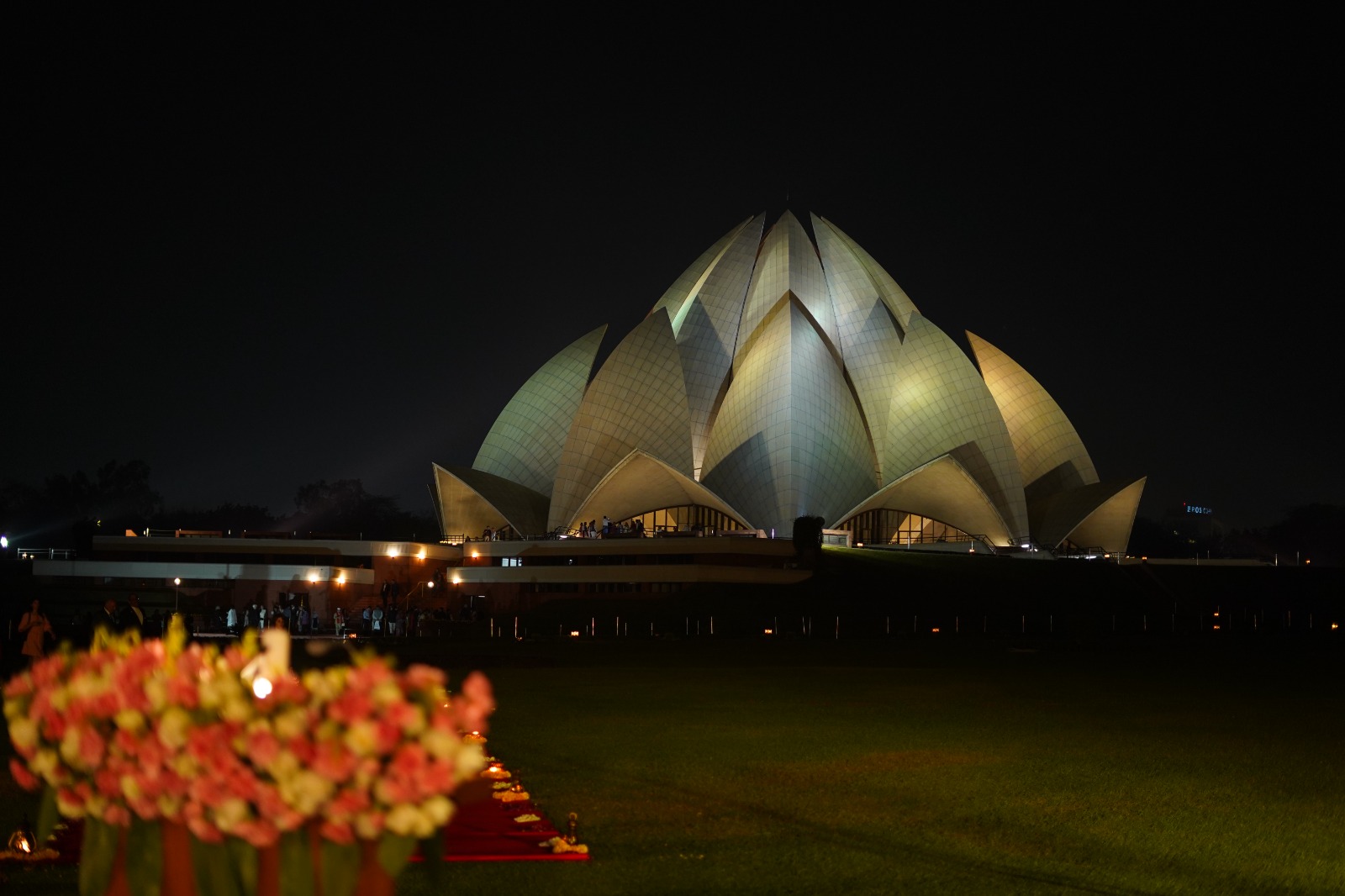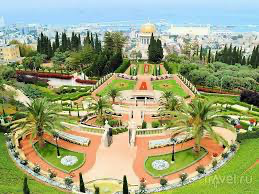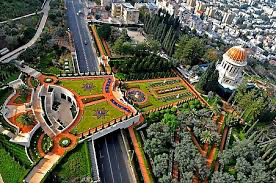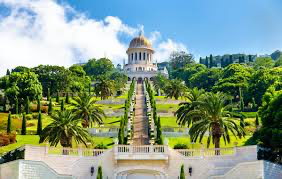Bahá’ís all around the world will commemorate the Annual Festival of Ridván, the “Most Great Festival” and the “King of Festivals” and it is the holiest festival in the Bahá’í Faith.

Therefore, let all of us (followers of Bahá’u’lláh) dive into these joyous celebrations, spiritual reflections and blooming gardens on the Festival of Ridván- the pinnacle of the Bahá’í calendar and to get ready to immerse ourselves in the spiritual atmosphere and jubilant celebrations of the Festival of Ridvan, landing on April 20, 28 and 1st May 2024.
(the first, ninth and the twelfth days of Riḍván Festival respectively).

The First Day of Riḍván Festival falls on this year on 13 Jalál, 181 B.E. (20 April 2024), the Ninth Day of Riḍván Festival falls on this year on 2 Jamál, 181 B.E. (28 April, 2024) and the Twelfth Day of Riḍván Festival falls on 5 Jamál, 181 B. E. (1st May, 2024).
The Festival of Ridván is a 12-day festival of the Baháʼí faith celebrated every year and starting on either April 20 or April 21- depending on the March equinox – and will be marked this year from April 20 to May 1. ‘Ridvàn’ is a word that means ‘paradise’ in Arabic and the 12 days of the festival commemorate the 12 days Baháʼu’lláh spent in the garden of Ridvàn in Baghdad, the modern-day capital of Iraq in 1863. This was where He declared Himself as ‘The Promised One’ to His followers. The first, ninth, and last (twelfth) days of the Ridván festival are holy and so no work is done on those days.

These celebrations commemorate the beginnings of the Bahá’í Faith in 1863, in a beautiful rose garden filled with the songs of nightingales on an island in the middle of the Tigris River. Called the Garden of Ridvan, which means “paradise,” this flowering, fragrant, birdsong-filled spot witnessed the birth of the world’s newest independent religion during these twelve days.

On this island near the ancient city of Baghdad, the Ridvan garden marks the exact place where Bahá’u’lláh first declared His Mission and inaugurated the Bahá’í Faith.
For Bahá’ís the twelve-day period between April 20th and May 1st marks the holiest and happiest festival of the year, called Ridvan. These Bahá’í Holy Days, which celebrate the beginning of the Bahá’í Faith in 1863 as its Founder Bahá’u’lláh prepared for exile, also recognize a period of great turmoil in Bahá’í history and signify the transformation of suffering and oppression into joy.
The Ridván Festival commemorates Bahá’u’lláh’s twelve-day sojourn in the garden of Ridván outside Baghdad, during the final days before His banishment to Istanbul, then known as Constantinople. Bahá’ís around the globe joyfully observe Ridván (which means paradise) as a festival of renewal and peace, because it commemorates the beginnings of the Bahá’í Faith and celebrates the first law of that new revelation, Bahá’u’lláh’s admonition to humanity to cease all warfare.
This year, Ridván begins at sunset on April 19th and lasts until sunset on May 1st.
Of the 12 days, there are only three holy days, as mentioned below, in which Bahá’ís do not go to work or school. Instead, they gather for prayers and religious meetings. Musical and artistic performances are also included in the festivities.
*The First Day of Riḍván 13 Jalál, 181 B.E. (20 April, 2024)*
*Ninth Day of Riḍván 2 Jamál, 181 B.E. (28 April, 2024)*
*Twelfth Day of Riḍván 5 Jamál, 181 B. E. (1 May, 2024)*
Nine days later His family joined Him. On the 12th day, they left.
Ridvan celebrates both the beginning of the Bahá’í Faith and Bahá’u’lláh’s stay in the garden. This all happened in 1863 — 160 years ago!
For Baháʼís, the time Baháu’lláh spent at the Garden of Ridván in April 1863, as well as the associated festival and celebration, is extremely significant. Bahá’u’lláh refers to it as one of two “Most Great Festivals.”
The Festival of Ridván is observed according to the Bahá’í calendar, and begins on the thirty-second day of the Bahá’í year, which falls on 20 or 21 April. The festival properly starts at two hours before sunset on that day, which symbolises the time that Bahá’u’lláh entered the garden. On the first, ninth, and twelfth days, which are Bahá’í Holy Days, work is prohibited, as mentioned above. Currently, the three holy days are usually observed with a community gathering where prayers are shared, followed by a celebration.
Ridván means paradise, and is named for the Garden of Ridván outside Baghdad, where Bahá’u’lláh stayed for twelve days after the Ottoman Empire exiled Him from the city and before commencing His journey to Constantinople.
Before Bahá’u’lláh left for Constantinople, many visitors came to visit Him. To allow His family to prepare for the trip, and to be able to receive all these visitors, He decided to move to the Najibiyyih garden across the Tigris river from Baghdad. He entered the garden on 21 April 1863 (31 days after Naw Rúz, which usually occurs on 21 March) accompanied by His sons ʻAbdu’l-Bahá, Mírzá Mihdí and Mírzá Muhammad ʻAlí, His secretary Mirza Aqa Jan and some others, and stayed there for eleven days.
Established in the mid-19th Century by Bahá’u’lláh, the Prophet-Founder of the Bahá’í Faith, this grand festival is fondly known as “The Most Great Festival” and holds immense significance in the Bahá’í calendar. During this 12-day period, Bahá’ís commemorate Bahá’u’lláh’s declaration of His Prophethood in a garden in Baghdad, which He named Ridván, meaning “Paradise”. With its exotic history and spiritual significance, it’s truly a festival that invites exploration and reflection. So let’s rejoice and dive into the splendor of the Festival of Ridván, the pinnacle of Bahá’í celebrations!
The Báb’s writings introduced the concept of “He whom God shall make manifest”, a Messianic figure whose coming, according to Bahá’ís, was announced in the scriptures of all of the world’s great religions.
While imprisoned at the Syáh-Chál in Tehran, Iran, in 1852, Baháu’lláh claimed that His Mission as the Promised One of the Báb was revealed to Him. Baháu’lláh was exiled from Persia after His release from the Syáh-Chál, and He settled in Baghdad, which became the center of the Bábi activity. Even though He did not openly disclose this Prophetic Mission, He grew to be the Báb community’s leader.
The First Day of Ridván is an important Baha’i holiday. Riḍván is a twelve-day festival that celebrates the beginnings of the Bahá’í Faith in 1863. It does this by commemorating Bahá’u’lláh’s declaration that He was a Manifestation of God.
As mentionef above, the Annual festival commemorating the 12 days when Bahá’u’lláh, the Prophet-Founder of the Bahá’í Faith, resided in a garden called Ridván (Paradise) and publicly proclaimed His Mission as God’s messenger for this Age.
Bahá’u’lláh’s time spent in the Garden of Ridvan is an important part of the Bahá’í Faith. Gardens have a great meaning in the religion. Baha’u’llah said, “In the garden of thy heart, plant naught but the rose of love.”
Lush gardens serve as a reminder of the garden where Bahá’u’lláh remained for those 12 days.
Riḍván is a twelve-day festival in the Bahá’í Faith, commemorating Bahá’u’lláh’s declaration that He was a Manifestation of God. In the Bahá’í calendar, it begins at sunset on the 13th of Jalál, which translates to the 20th or 21 April, depending on the date of the March equinox (exactly one month on the Gregorian calendar after the equinox.
After His arrival in the garden, Bahá’u’lláh announced His mission and station for the first time to a small group of family and friends. The exact nature and details of Bahá’u’lláh’s declaration are unknown. Bahíyyih Khánum is reported to have said that Bahá’u’lláh stated His claim to His son ʻAbdu’l-Bahá and four others. While some Bábís had come to the realization that Bahá’u’lláh was claiming to be the Promised One through the many remarks and allusions that he had made during His final few months in Baghdad, it appears that most other Bábís were unaware of Bahá’u’lláh’s claim until a few years later while he was in Edirne.
In the Kitáb-i-Aqdas, written during 1873, Bahá’u’lláh ordains Ridván as one of two “Most Great Festivals”, along with the Declaration of the Báb. He then specified the first, ninth, and twelfth days to be holy days; these days mark the days of Bahá’u’lláh’s arrival, the arrival of his family and their departure from the Ridván garden, respectively.
The time that Bahá’u’lláh spent at the Garden of Ridván in April 1863, and the associated festival and celebration, has a very large significance for Bahá’ís. Bahá’u’lláh calls it one of two “Most Great Festivals” and describes the first day as “the Day of supreme felicity” and he then describes the Garden of Ridvan as “the Spot from which He shed upon the whole of creation the splendours of his Name, the All-Merciful”.
The Ridván period is also the time when Bahá’í elections for the local and national Spiritual Assemblies take place every year, as well as the election of the Universal House of Justice, every five years.
Furthermore, during Bahá’u’lláh’s first day in the garden, He made three further announcements: (1) abrogating religious war, which was permitted under certain conditions in Islam and the Bábí faith; (2) that there would not be another Manifestation of God for another 1,000 years; and (3) that all the names of God were fully manifest in all things.
These statements appear in a text written some years after 1863, which has been included in the compilation Days of Remembrance (section 9). Nader Saiedi states that these three principles are “affirmed, expounded, and institutionalized” in Bahá’u’lláh’s Kitab-i-Aqdas, which was completed in 1873.
Bahá’u’lláh claimed that His mission as the Promised One of the Báb, was revealed to Him in 1852 while imprisoned in the Síyáh-Chál in Tehran, Iran.
After His release from the Síyáh-Chál, Bahá’u’lláh was banished from Persia, and He settled in Baghdad, which became the centre of Bábí activity. Although He did not openly declare this prophetic mandate, He increasingly became the leader of the Bábí community.
Bahá’u’lláh’s rising prominence in the city, and the revival of the Persian Bábí community, gained the attention of His enemies in Islamic clergy and the Persian government. They were eventually successful in having the Ottoman government summon Bahá’u’lláh from Baghdad to Constantinople (present-day Istanbul).
Many people came to see Baháu’lláh before He left. He moved to the Najibiyyih garden across the Tigris river from Baghdad to give His family time to prepare for the trip and to be able to greet all of these visitors. Although He was accompanied by His sons, Bahá’lláh’s family could not join him until April 30, the ninth day, because the water had risen and made passage to the garden difficult, although the flooding was only nine days long. Baháu’lláh and His family left the garden on the twelfth day of their stay and embarked on their journey to Constantinople, as mentioned above.
The festival is significant because of Bahá’u’lláh’s private declaration to a few followers that he was “Him Whom God shall make manifest” and a Manifestation of God, and thus it forms the beginning point of the Bahá’í Faith, as distinct from the Babi religion. It is also significant because Bahá’u’lláh left His house in Baghdad, which he designated the “Most Great House”, to enter the Garden of Ridván. Bahá’u’lláh compares this move from the Most Great House to the Garden of Ridván to Muhammad’s travel from Mecca to Medina.
Annually, during Ridván, the Universal House of Justice sends a ‘Ridván message’ to the worldwide Bahá’í community, which generally looks back on the previous year, and provides further guidance for the coming year.
Festival of Ridvan is Important because of the following reasons:
It’s a time for spiritual reflection.
The Festival of Ridván provides an opportunity to delve deeper into spiritual reflections. It’s the time for Bahá’ís to commemorate Bahá’u’lláh’s declaration of His Prophethood, a significant moment in the Bahá’í faith. Through storytime and community prayers, we’re reminded of the spiritual essence of our existence.
It fosters a sense of community.
During this period, Bahá’ís all over the world come together to celebrate. Being part of the prayers, music nights, and other Ridván activities cultivates a profound sense of belonging, unity, and community engagement. Whether it’s through communal gatherings or virtual meetings, the festival strengthens our bonds with fellow believers.
It promotes creativity and joy.
The Festival of Ridván is not all solemn reflections. It is equally about celebrating joyfully and creatively. By making flower crafts, creating personal Ridván gardens, or organizing music nights, we can express our happiness and create lasting memories with our families and community members.
Bahá’u’lláh ultimately suffered forty years of exile, imprisonment and torture for His declaration of the peaceful, progressive Bahá’í principles.
This is the Day in which God’s most excellent favors have been poured out upon men, the Day in which His most mighty grace hath been infused into all created things. It is incumbent upon all the peoples of the world to reconcile their differences, and, with perfect unity and peace, abide beneath the shadow of the Tree of His care and loving-kindness.
Believers of Bahá’u’lláh are ordained to observe the holy days:
The first, ninth, and twelfth days are regarded as the holy days of the festival. For Baha’i adherents, on these days, all work should be suspended.
The festival of Ridvan is a period of celebration and joy. As such, no ill deeds should be perpetrated and only love should be shared.
The first day of the festival commemorates the day Bahá’u’lláh entered the garden of Ridvan and declared that He was the Promised One.
On the ninth day, Baháʼu’lláh’s family joined Him in the garden of Ridván.
The twelfth day is special
On the twelfth and final day, Baháʼu’lláh departed to Constantinople where He was exiled.
The festival of Ridván happened because Baháʼu’lláh brought with Him a new Faith. This ushered in a New Era of the Baháʼí faith.
Compiled by
*Jaya Raju Thota, Greater Visakhapatnam, India










